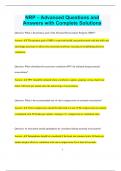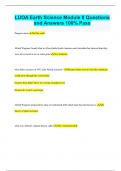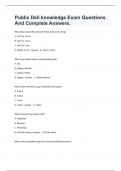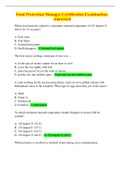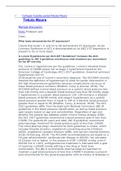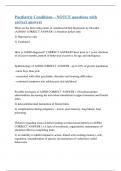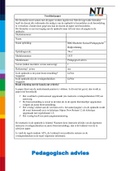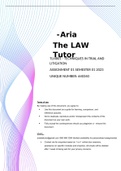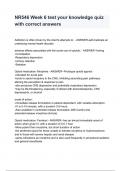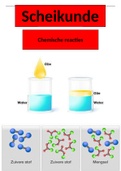Answers with Complete Solutions
Question: What is the primary goal of the Neonatal Resuscitation Program (NRP)?
Answer: ✔✔ The primary goal of NRP is to provide health care professionals with the skills and
knowledge necessary to effectively resuscitate newborns, focusing on establishing effective
ventilation.
Question: When should positive pressure ventilation (PPV) be initiated during neonatal
resuscitation?
Answer: ✔✔ PPV should be initiated when a newborn is apneic, gasping, or has a heart rate
below 100 beats per minute after the initial steps of resuscitation.
Question: What is the recommended rate of chest compressions in neonatal resuscitation?
Answer: ✔✔ Chest compressions should be delivered at a rate of 90 compressions per minute,
coordinated with 30 breaths per minute, creating a 3:1 compression-to-ventilation ratio.
Question: At what point should epinephrine be considered during neonatal resuscitation?
Answer: ✔✔ Epinephrine should be considered if the heart rate remains below 60 beats per
minute despite effective ventilation with chest compressions for at least 60 seconds.
1
,Question: How is the correct size of an endotracheal tube determined for neonatal intubation?
Answer: ✔✔ The correct size of an endotracheal tube is determined based on the newborn’s
weight. For infants weighing less than 1,000 grams, a 2.5 mm tube is recommended, and for
those between 1,000 and 2,000 grams, a 3.0 mm tube is used.
Question: What is the appropriate oxygen concentration for resuscitating term newborns?
Answer: ✔✔ For term newborns, resuscitation should be started with room air (21% oxygen),
adjusting the oxygen concentration based on the newborn's response and pulse oximetry
readings.
Question: What are the key components of the initial steps in neonatal resuscitation?
Answer: ✔✔ The initial steps include providing warmth, positioning the head and neck, clearing
the airway if needed, drying and stimulating the newborn, and repositioning to open the airway.
Question: When should therapeutic hypothermia be considered for a newborn?
Answer: ✔✔ Therapeutic hypothermia should be considered for a newborn with moderate to
severe hypoxic-ischemic encephalopathy (HIE) who meets criteria for cooling, generally
initiated within 6 hours of birth.
2
, Question: What is the purpose of using CPAP in neonatal resuscitation?
Answer: ✔✔ CPAP (Continuous Positive Airway Pressure) is used to maintain lung inflation
and improve oxygenation in newborns with respiratory distress who can breathe spontaneously
but require support.
Question: How is the heart rate monitored during neonatal resuscitation?
Answer: ✔✔ The heart rate is monitored using a pulse oximeter or ECG leads, with the goal of
achieving a heart rate above 100 beats per minute.
Question: What is the appropriate depth for chest compressions during neonatal resuscitation?
Answer: ✔✔ Chest compressions should be performed to a depth of approximately one-third of
the anterior-posterior diameter of the newborn’s chest.
Question: When should advanced airway management, such as endotracheal intubation, be
considered in neonatal resuscitation?
Answer: ✔✔ Advanced airway management should be considered if positive pressure ventilation
is not effective, if chest compressions are required, or if the newborn requires tracheal suctioning
due to suspected meconium aspiration.
3

